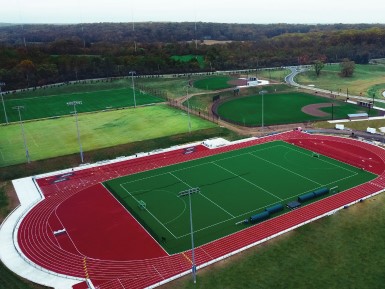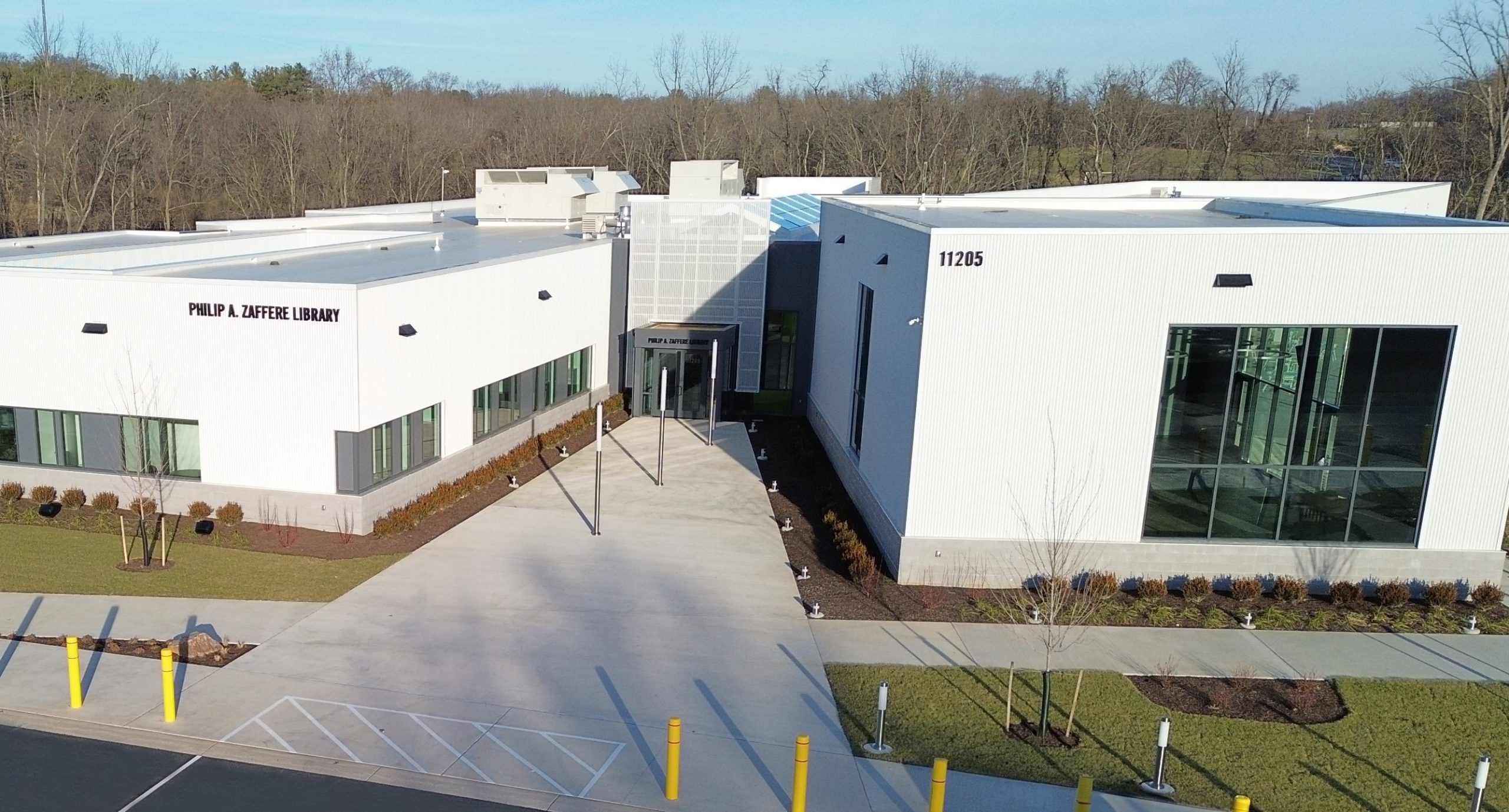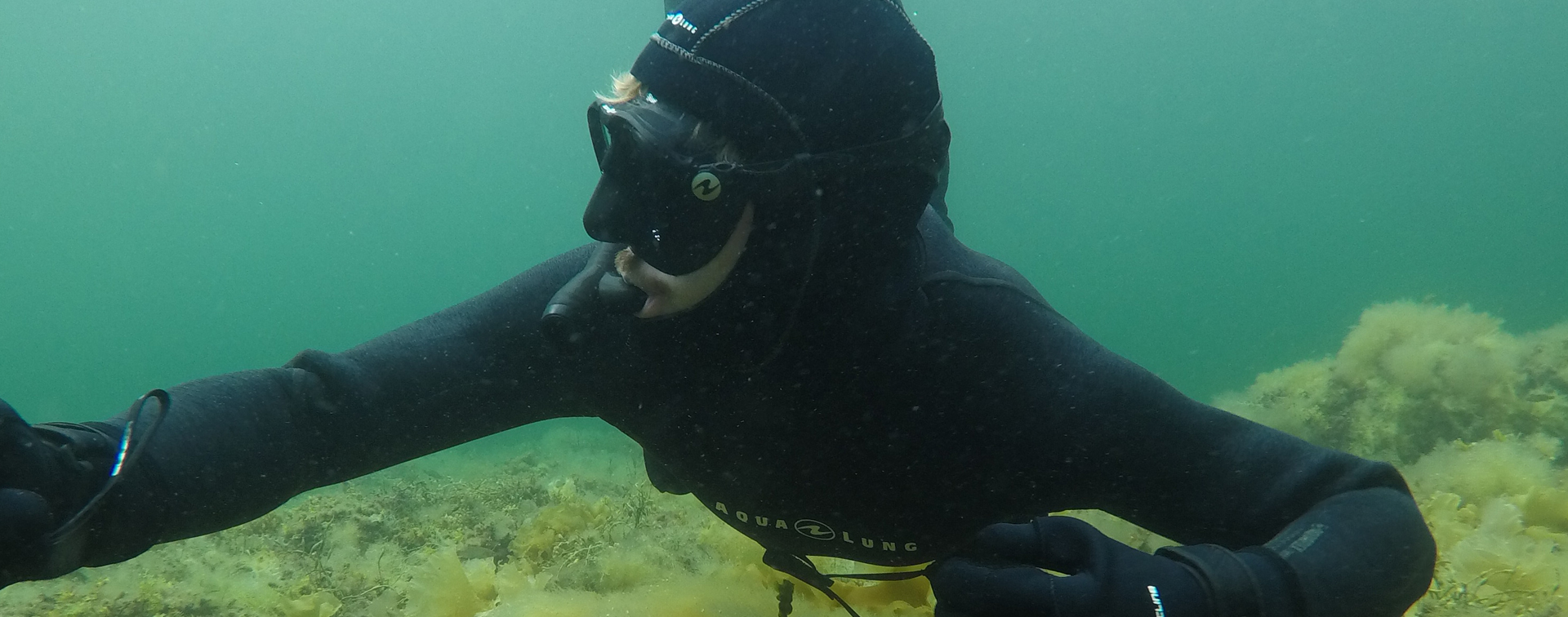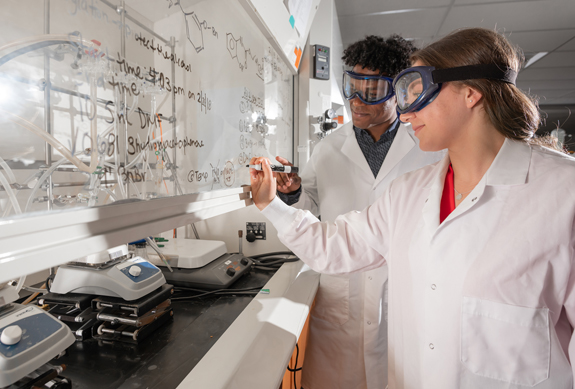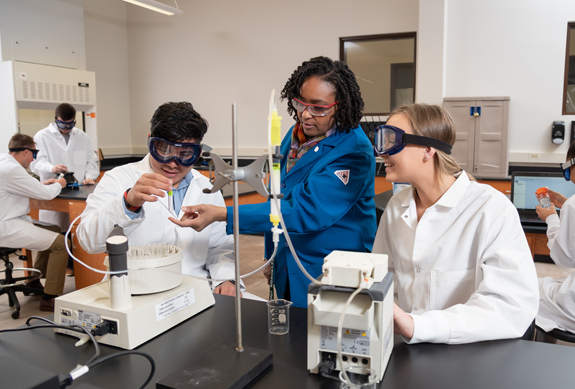Address Global Challenges & Protect the Environment
BACHELOR OF SCIENCE
Stevenson’s Bachelor of Science in Environmental Science gives you a foundation for understanding and improving the relationship between human society and the organisms, landforms, atmosphere, and ecosystems that make up our natural environment.
This program will engage you in a study of the principles, methodologies, and practices of the life, physical, and mathematical sciences as they relate to the environment. The foundational concepts of human systems, such as businesses, governments, and communities, and their impact on the environment, will also be studied. An emphasis on experiential and lifelong learning will prepare you to meet the needs of today’s society and the challenges of the future.
Want to go the extra mile? Our Bachelor’s to Master’s Option allows you to graduate with a master’s in as little as five years.
Graduates of the Environmental Science program will:
- Solve environmental problems by integrating knowledge from the natural and social sciences.
- Evaluate the effects of humans on the biosphere.
- Apply field and laboratory research skills and techniques to the investigation of scientific questions.
- Evaluate environmental issues and advances using scientific literature.
- Communicate scientific findings in written and oral formats appropriate to the specific audience.
- Conduct himself or herself in a manner consistent with the professional and ethical standards of the discipline.
- Practice environmental stewardship.
- Apply academic preparation to professional experiences outside the classroom.
Above and Beyond the Classroom
Experiential learning is at the heart of a Stevenson University education. The tree canopies above us are an important part of the larger ecosystem, although they are above our heads and we barely notice. Stevenson University Environmental Science major Ian Sachs explores the tree canopies of Stevenson’s Owings Mills campus to discover and document the living things that call these heights their home.
Stevenson Environmental Science
Career Connections
Internship Placements
- Anatomy Gift Registry
- Baltimore County Department of Recreation and Park
- Center for Disease Control
- REU Funded by National Science Foundation
- Wyoming Forest Service
Top Employers
- MS State Police Forensic Science Lab
- The Institute of Marine
and Environmental Technology - US Peace Corps
- Valley Forge National Historic Park
- Yale School of
Environment
Career Pathways
- Climate Change Analyst
- Forestry and Conservation Science
- Geoscience
- Industrial Ecologist
- Zoologist

Meet Our Students & Alumni
An Immersive Internship
Sarah Kinsey
Biology and Environmental Science Major
Sarah always enjoyed science and knew she wanted to work with animals in some aspect. At Stevenson, exploring different elective classes led Sarah to what would become her passion: wildlife conservation.
Study Environmental Science at Stevenson
Courses
The courses in the preview below are required for completion of the bachelor’s degree in Environmental Science. Students must complete all remaining major requirements in addition to the Stevenson Educational Experience (SEE) courses.
Major Requirements
| BIO 113 | General Biology I: Cell Biology and Genetics | 3 credits |
| CHEM 115 | General Chemistry I | 3 credits |
| CHEM 203 | Environmental Chemistry | 3 credits |
| ENV 255 | Techniques in Environmental Science | 3 credits |
| ENV 275 | Environmental Science | 3 credits |
| ENV 285 | Geographic Information Systems | 3 credits |
| ENV 375 | Environmental Ethics | 3 credits |
Academic Catalog
Explore our academic catalog for a full listing of courses, course descriptions, and suggested course sequence for Stevenson’s Environmental Science program.
Major Requirements
| FYS 100 | First Year Seminar | 1 credit |
| BIO 112 | Principles of General Biology | 3 credits |
| or | ||
| BIO 113 | General Biology I: Cell Biology and Genetics | 3 credits |
| BIO 113L | General Biology I Laboratory: Cell Biology and Genetics | 1 credit |
| BIO 114 | General Biology II: Structure and Function of Organisms | 3 credits |
| BIO 114L | General Biology II Laboratory: Structure and Function of Organisms | 1 credit |
| BIO 115 | General Biology III: Ecology and Evolution | 3 credits |
| BIO 218 | Career Connections in the Life Sciences | 1 credit |
| CHEM 114 | General Chemistry I with Problem Solving | 3 credits |
| or | ||
| CHEM 115 | General Chemistry I | 3 credits |
| CHEM 115L | General Chemistry I Laboratory | 1 credit |
| CHEM 116 | General Chemistry II | 3 credits |
| CHEM 116L | General Chemistry II Laboratory | 1 credit |
| CHEM 203 | Environmental Chemistry | 3 credits |
| CHEM 203L | Environmental Chemistry Laboratory | 1 credit |
| ENV 255 | Techniques in Environmental Science | 3 credits |
| ENV 275 | Environmental Science | 3 credits |
| ENV 285 | Geographic Information Systems | 3 credits |
| ENV 375 | Environmental Ethics | 3 credits |
| ENV 470 | Capstone Internship | 3 credits |
| or | ||
| ENV 471 | Capstone Internship | 6 credits |
| ENV 475 | Capstone Seminar | 3 credits |
| MATH 136 | Introduction to Statistics | 4 credits |
| SCI 215 | Writing in the Sciences | 3 credits |
Select two of the following courses:
| EC 201 | Principles of Macroeconomics | 3 credits |
| EC 202 | Principles of Microeconomics | 3 credits |
| EC 240 | Environmental Economics | 3 credits |
| LAW 375 | Environmental Law | 3 credits |
| POSCI 102 | American Government: Political Institutions and Procedures | 3 credits |
Environmental Science Electives:
Take six courses from the following courses listed below
- At least three courses must be at the 300- or 400-level
- At least three courses must be lab courses
- A maximum of two courses with the BIO or CHEM course prefix designator
- A maximum of one research course
ENV 213, ENV 260, ENV 280, ENV 310, ENV 320, ENV 330, ENV 360, ENV 362, ENV 365, ENV 410, ENV 420, BIO 203, BIO 210, BIO 217, BIO 222, BIO 230, BIO 270, BIO 280, BIO 307, BIO 310, BIO 312, BIO 313, BIO 314, BIO 315, BIO 322, BIO 326, BIO 330, BIO 332, BIO 335, BIO 362, CHEM 206, CHEM 210/CHEM 210L, CHEM 211/CHEM 211L, CHEM 221, CHEM 310, CHEM 346L
Students can take either BIO 217 or BIOCH 327 but not both. Students can take BIO 322 or BIO 326 but not both.
Minors and Other Options
Minor in Environmental Science
Environmental Science studies the connections between humans and the environment. Therefore, a minor in Environmental Science is an excellent addition to many liberal arts majors and is particularly relevant to students interested in the environmental aspects of business, economics, policy, law, health, or for those simply interested in understanding our responsibility as caretakers of planet Earth.
Please see the Chair of the Department of Biological Sciences for further information regarding this minor. General guidelines regarding minors may be found in the Minors section of the catalog.
Add a Professional Minor
Open yourself up to additional career paths with one of our professional minors. Each minor is designed to pair with students’ majors to give them additional career options, a competitive edge in the job market, and an opportunity to shape their Stevenson experience to meet their specific career goals.
Biology Department Honors Requirements
Eligible students majoring in environmental science may elect to pursue honors within the Department of Biological Sciences. The intention to pursue biology department honors must be declared no later than the end of the first semester of the junior year. To declare the intent to pursue departmental honors, a student must have earned a science GPA of 3.50 or higher.
Students graduating with biology department honors will have this distinction noted on their official university transcript. In order to graduate with departmental honors, the following requirements must be met:
- Completion of a 400-level capstone experience with a grade of “B” or better
- Completion of BIO 440 Seminar Topics in Biology with a grade of “B” or better
- Completion of an Honors Contract Project in an upper-level biology or environmental science course. A grade of “B” or better must be earned in the course in which an Honors Contract Project is completed. The student must submit a contract project proposal to be approved by department faculty before beginning the project. The final project must be approved by department faculty in order to receive honors credit.
- A science GPA of 3.50 or higher at the time of graduation
Bachelor’s to Master’s Options
BS/MS options are available for students majoring in Environmental Science who wish to combine their bachelor’s coursework while working toward a Stevenson University Master’s Degree in one of the following:
Explore more Bachelor’s to Master’s Options
Service-Learning Options
Service learning options are offered periodically with some environmental science courses. Please consult the course instructor or the department chair if you have any questions.
Laboratory Tours
Featured Equipment
- Binocular Light Microscopes
- Herbarium
- Plant Cell Culture Hood
- Temperature-controlled Incubators
- Preserved Biological Specimens
- Laptop Computers
Scholarship Opportunities
Sciences Scholarship
Stevenson’s Beverly K. Fine School of the Sciences offers scholarships for incoming freshman students who plan to major in Biochemistry, Biology, Biomedical Engineering, Chemistry, Environmental Science, or Mathematics. We invite you to submit a personal statement to be considered for the Sciences Scholarships. Awards are $2,000 and can be combined with a Stevenson merit-based scholarship award from Admissions. Awards are renewable for four years.
Environmental Science News

The essay identifies how a scientific society can catalyze representational, structural, and interactional diversity to achieve greater inclusion. This requires intentional commitment to capacity building, community engagemen.

Students enjoyed a "Biology Brain Break" outdoors on OMN! Each week the biology department is hosting a different event to give students the opportunity to take a break and socialize with fellow students, faculty, and staff.

Congratulations to SU biology student, Tiana Marshall, on acceptance to Veterinary School! Tiana was recently accepted to Virginia – Maryland College of Veterinary Medicine.

Lead and Manage a Scientific Team
Students majoring in Environmental Science can prepare to direct projects and teams with a professional minor in Management and Organizational Leadership, opening doors to leadership careers in the scientific industry, clinical management, or business.
Have a Question?
Contact Admissions
Undergraduate Admissions
Owings Mills Campus
Garrison Student Union
North Entrance, Second Floor
1-877-468-6852
